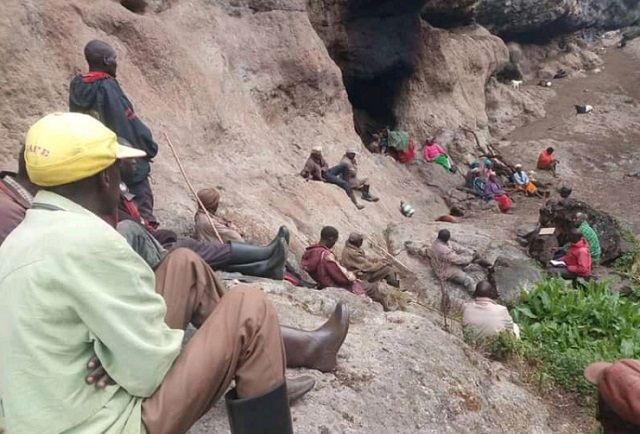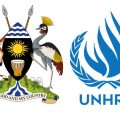Kapchewuut cave in Benet Sub-County in Kween District still acts as a home for some of the evicted people who were evicted 13 years ago from their ancestral home.
Kampala, Uganda. The Ugandan government must recognise the Benet as the indigenous inhabitants of the forest from which it evicted them and restore them to their ancient home.
Amnesty International, the London-based international human rights NGO made the demand in a report titled, ‘13 Years in Limbo: Forced Evictions of the Benet in the Name of Conservation,’ that it launched on Nov.08.
“The treatment of the Benet is a flagrant violation of Uganda’s constitution and its own international human rights obligations,” said Deprose Muchena, Amnesty International’s Regional Director for East and Southern Africa during the release of the report.
This is the latest call for the restoration of the rights of the Benet, a community of an estimated 18,000 people who lost their ancestral land in Mount Elgon area of Sebei in eastern Uganda in 1920 when the British colonial protectorate classified the moorland and grasslands as a forest reserve.
Subsequent governments have piled violations on the minority group, including violent forced evictions since 1983, further deepening the plight and poverty of this community. Amnesty International says the Benet face a multi-generational struggle.
The Benet is one of Uganda’s indigenous ethnic minority groups who have been deprived of their right to health, adequate housing and education, it said.
“They are still living in temporary settlements made of flimsy huts of mud and stick, deprived of essential services such as clean drinking water and electricity and cut off from healthcare and education,” said Muchena.
Perhaps the most brutal evictions happened on Feb.16 in 2008 when 178 families were rendered homeless.
The Uganda Wildlife Authority and the national army—the Uganda People’s Defence Forces (UPDF)—forcefully evicted the families claiming they were still settled inside the national park despite government allocating the same land to them after previous evictions.
People’s houses and crops were destroyed, cattle were confiscated. The displaced Benet found shelter wherever they could: in caves and under trees. The luckier ones stayed in a nearby primary school or joined relatives elsewhere.
David Chemutai, the current coordinator of the Benet-Mosop Indigenous Community Association, a community based organisation in Kween District in eastern Uganda still remembers the 2008 evictions.
“I came back home from school only to find our home burnt. All the houses in the homestead were burnt,” he told The Independent on Nov.10, “Our food which we used to keep in the house was also burnt. My parents were gone and I did not know where to find them.”
Chemutai who was 23 at the time was only able to find his parents days later in a cave. Over a decade later, hundreds of families of the Benet community still live in temporary resettlement sites. Some still live in the cave.
They accuse UWA of killings, unlawful use of force and firearms, including shootings, beatings, and even crimes under international law, including torture and other cruel, inhuman and degrading treatment. This often happens when they try to enter the forest which was declared a national park in 1993.
In 2004, the Uganda Land Alliance (ULA) filed a legal suit, Uganda Land Alliance, Ltd. v. Uganda Wildlife Authority in the High Court of Uganda on behalf of the Benet community, for enforcement of their right to use their forest land.
On 27 October 2005, the court in a judgment commonly referred to as the “Consent Judgment”, which was settled and agreed to by the affected Benet community, the UWA, and the Attorney General of Uganda, recognised the Benet as the historical and indigenous inhabitants of the forest that the government had classified a national park in 1993.
The judgment underlined the need to “redress the imbalance” facing the Benet in education, infrastructure, health, and social services, provided for under Article 32 of Uganda’s Constitution.
Despite the court ruling, the Benet are still not permitted to build permanent structures and live in small huts constructed from sticks and mud in temporary resettlement camps, with no electricity and potable water.
The restriction has impacted the Benet peoples’ agro-pastoral lifestyle and other economic, social, and cultural practices such as the right to access cultural sites for rituals, fruit gathering, bee keeping, and hunting.
“We are now a stateless community,” says Chemutai, “This is something we are still fighting for.”
The Uganda Wildlife Authority insists it is not to blame for the fate of the Benet.
“We are not responsible for the gazettement and degazettement of these places. The Uganda Wildlife Authority only manages these spaces,” Bashir Hangi, the UWA public relations officer,told The Independent on Nov.10, “Regardless whether they were evicted or not, when the government handed over the area to us, we had no alternative but remove the people.”
But Amnesty International’s Muchena says academic research says conservation, such as by UWA, works best when the state works with the indigenous people as equal partners in conservation.
“It must not result in human rights violations, or be used to justify them,” he said.
Original Source: independent.co.ug


 MEDIA FOR CHANGE NETWORK2 weeks ago
MEDIA FOR CHANGE NETWORK2 weeks ago
 SPECIAL REPORTS AND PROJECTS2 weeks ago
SPECIAL REPORTS AND PROJECTS2 weeks ago
 MEDIA FOR CHANGE NETWORK2 days ago
MEDIA FOR CHANGE NETWORK2 days ago
 SPECIAL REPORTS AND PROJECTS2 weeks ago
SPECIAL REPORTS AND PROJECTS2 weeks ago
 MEDIA FOR CHANGE NETWORK1 week ago
MEDIA FOR CHANGE NETWORK1 week ago
 MEDIA FOR CHANGE NETWORK4 days ago
MEDIA FOR CHANGE NETWORK4 days ago
 MEDIA FOR CHANGE NETWORK3 days ago
MEDIA FOR CHANGE NETWORK3 days ago
 NGO WORK4 days ago
NGO WORK4 days ago


























